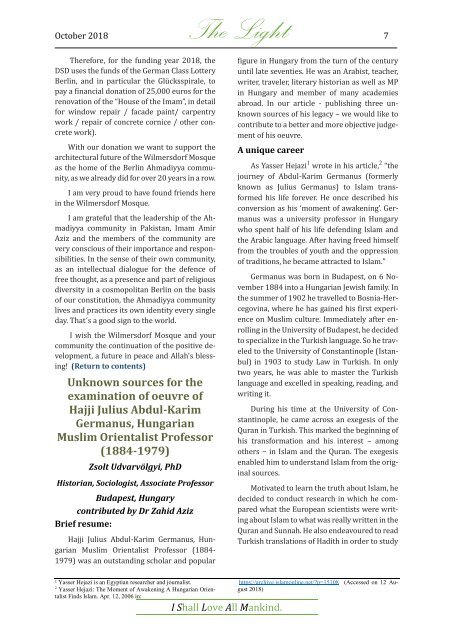The Light 2018 10 October
Representing the Lahore-Ahmadiyya Movement's interpretation of Islam as a peaceful, inclusive, rational, scientific and loving religion.
Representing the Lahore-Ahmadiyya Movement's interpretation of Islam as a peaceful, inclusive, rational, scientific and loving religion.
You also want an ePaper? Increase the reach of your titles
YUMPU automatically turns print PDFs into web optimized ePapers that Google loves.
<strong>October</strong> <strong>2018</strong> <strong>The</strong><br />
<strong>Light</strong> 7<br />
<strong>The</strong>refore, for the funding year <strong>2018</strong>, the<br />
DSD uses the funds of the German Class Lottery<br />
Berlin, and in particular the Glu cksspirale, to<br />
pay a financial donation of 25,000 euros for the<br />
renovation of the “House of the Imam”, in detail<br />
for window repair / facade paint/ carpentry<br />
work / repair of concrete cornice / other concrete<br />
work).<br />
With our donation we want to support the<br />
architectural future of the Wilmersdorf Mosque<br />
as the home of the Berlin Ahmadiyya community,<br />
as we already did for over 20 years in a row.<br />
I am very proud to have found friends here<br />
in the Wilmersdorf Mosque.<br />
I am grateful that the leadership of the Ahmadiyya<br />
community in Pakistan, Imam Amir<br />
Aziz and the members of the community are<br />
very conscious of their importance and responsibilities.<br />
In the sense of their own community,<br />
as an intellectual dialogue for the defence of<br />
free thought, as a presence and part of religious<br />
diversity in a cosmopolitan Berlin on the basis<br />
of our constitution, the Ahmadiyya community<br />
lives and practices its own identity every single<br />
day. That´s a good sign to the world.<br />
I wish the Wilmersdorf Mosque and your<br />
community the continuation of the positive development,<br />
a future in peace and Allah's blessing!<br />
(Return to contents)<br />
Unknown sources for the<br />
examination of oeuvre of<br />
Hajji Julius Abdul-Karim<br />
Germanus, Hungarian<br />
Muslim Orientalist Professor<br />
(1884-1979)<br />
Zsolt Udvarvölgyi, PhD<br />
Historian, Sociologist, Associate Professor<br />
Budapest, Hungary<br />
contributed by Dr Zahid Aziz<br />
Brief resume:<br />
Hajji Julius Abdul-Karim Germanus, Hungarian<br />
Muslim Orientalist Professor (1884-<br />
1979) was an outstanding scholar and popular<br />
figure in Hungary from the turn of the century<br />
until late seventies. He was an Arabist, teacher,<br />
writer, traveler, literary historian as well as MP<br />
in Hungary and member of many academies<br />
abroad. In our article - publishing three unknown<br />
sources of his legacy – we would like to<br />
contribute to a better and more objective judgement<br />
of his oeuvre.<br />
A unique career<br />
As Yasser Hejazi 1 wrote in his article, 2 “the<br />
journey of Abdul-Karim Germanus (formerly<br />
known as Julius Germanus) to Islam transformed<br />
his life forever. He once described his<br />
conversion as his ‘moment of awakening’. Germanus<br />
was a university professor in Hungary<br />
who spent half of his life defending Islam and<br />
the Arabic language. After having freed himself<br />
from the troubles of youth and the oppression<br />
of traditions, he became attracted to Islam.”<br />
Germanus was born in Budapest, on 6 November<br />
1884 into a Hungarian Jewish family. In<br />
the summer of 1902 he travelled to Bosnia-Hercegovina,<br />
where he has gained his first experience<br />
on Muslim culture. Immediately after enrolling<br />
in the University of Budapest, he decided<br />
to specialize in the Turkish language. So he traveled<br />
to the University of Constantinople (Istanbul)<br />
in 1903 to study Law in Turkish. In only<br />
two years, he was able to master the Turkish<br />
language and excelled in speaking, reading, and<br />
writing it.<br />
During his time at the University of Constantinople,<br />
he came across an exegesis of the<br />
Quran in Turkish. This marked the beginning of<br />
his transformation and his interest – among<br />
others − in Islam and the Quran. <strong>The</strong> exegesis<br />
enabled him to understand Islam from the original<br />
sources.<br />
Motivated to learn the truth about Islam, he<br />
decided to conduct research in which he compared<br />
what the European scientists were writing<br />
about Islam to what was really written in the<br />
Quran and Sunnah. He also endeavoured to read<br />
Turkish translations of Hadith in order to study<br />
1<br />
Yasser Hejazi is an Egyptian researcher and journalist.<br />
2<br />
Yasser Hejazi: <strong>The</strong> Moment of Awakening A Hungarian Orientalist<br />
Finds Islam. Apr. 12, 2006 in:<br />
I Shall Love All Mankind.<br />
https://archive.islamonline.net/?p=15<strong>10</strong>8 (Accessed on 12 August<br />
<strong>2018</strong>)














